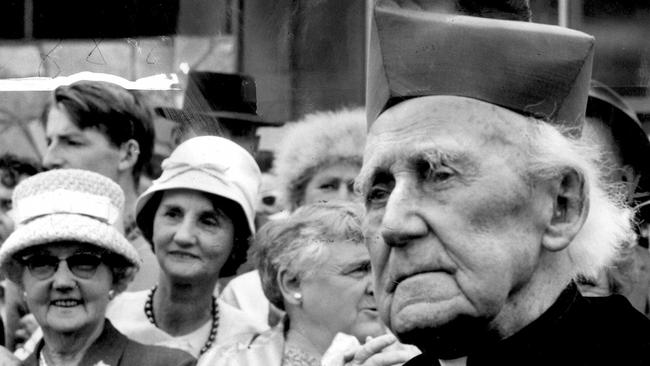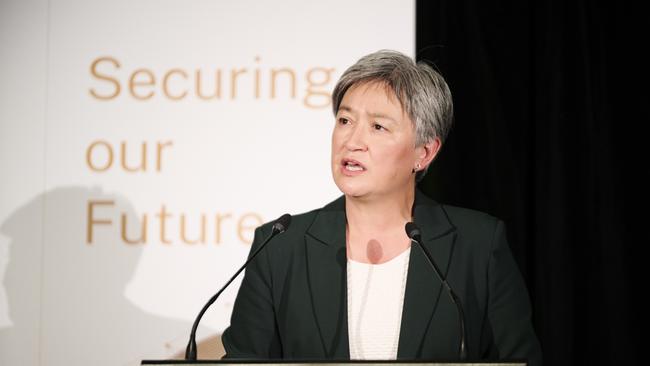Despite the desire to keep them separate, religion and politics have always gone together


This warning was directed particularly at Catholics, many of whom were of Irish heritage. During the 1917 plebiscite, on whether there should be conscription for overseas service during the First World War, Daniel Mannix (the Irish-born Catholic archbishop of Melbourne) was criticised for his strong advocacy of the No case.
Then, after the disastrous Australian Labor Party split in 1955, which was primarily caused by Labor leader Bert Evatt, Mannix and three other Victorian bishops were criticised for supporting the primarily Catholic Democratic Labor Party, which was formed following the expulsion/resignation of many Labor members. It directed its preferences to the Coalition led by Robert Menzies.
Critics of Mannix at the time overlooked the fact that many Catholic leaders supported conscription in 1917. And that, in the mid-1950s, the Catholic archbishops in Sydney and Adelaide supported the ALP and opposed the DLP.
In these pages on Monday, Alexi Demetriadi reported that “at least two newly registered websites – The Muslim Vote and Muslim Votes Matter – are circulating among political and community circles which rank MPs in ‘focus electorates’ where the Muslim population is about 10 per cent or more”.
The aim of both groups is to put pressure on Prime Minister Anthony Albanese and his Labor government to take a harder line against Israel in the war that commenced on October 7 last year – when Hamas broke a ceasefire and invaded a part of southern Israel that has been part of the Jewish state since 1948.
Many Muslim and non-Muslim Australians want the Albanese government to push hard on Israel to initiate a ceasefire. This despite the fact Hamas commenced the hostilities with its brutal attack on Israel, which involved serious war crimes including the taking of civilian hostages – children, women and men alike.
I am not aware of any supporter of the Palestinian cause who is calling on Hamas to surrender and release the living hostages along with the bodies of the dead. But this is the quickest and easiest way to end the conflict.
Muslim Australians are perfectly entitled to express their views provided that, like all other Australians, they act within the law. But it’s only realistic to make the point that the Israeli government – whether led by Benjamin Netanyahu or not – is unlikely to take much notice of what Australia says.
Israel is fighting for its existence against Hamas, which is intent on driving the citizens of Israel out of their country – from the Jordan River to the Mediterranean Sea. A nation that is threatened is unlikely to take much notice of another nation that is a long way away and currently does not project power into the region of the Middle East.
In view of this, the likes of The Muslim Vote and Muslim Votes Matter are engaged in symbolic politics. The aim is to pressure Labor MPs in seats that have large Muslim minorities in western Sydney – such as Blaxland, Watson and Werriwa – along with Wills in the northern suburb of Melbourne.
They are held by Jason Clare, Tony Burke, Anne Stanley and Peter Khalil respectively. Clare and Burke have been outspoken in their criticism of Israel’s tactics in its self-defence. This despite the fact that Hamas, which is intent on the destruction of the Jewish state, in its charter vows that Israel will “exist until Islam will obliterate it”.
The tactics of The Muslim Vote and Muslim Votes Matter do not make much sense. Two recent speeches make the point.
On April 9, Foreign Minister Penny Wong gave an address to the ANU National Security College that has been interpreted as the most critical of Israel by an Australian minister. The next day Opposition Leader Peter Dutton, delivering the Tom Hughes Oration at the Sydney Opera House, criticised Wong and expressed strong support for Israel.

Why, then, would Muslim Australians want to bring about the defeat of a government in which Senator Wong ranks third in order of importance – and replace Labor with a government led by Dutton in which Senator Simon Birmingham, also a strong supporter of Israel, would be likely to hold the foreign affairs portfolio?
The political situation today is not like it was in 1955 when the DLP faced its first election. Thousands of Victorian lifelong ALP and trade union members, like my father, voted for the DLP and gave their second preference to the Coalition. Many did not like Menzies or the Liberal Party much – but they preferred Menzies to Evatt.
The Labor Split spread to Queensland in 1957 and the DLP ran in all states in the 1958 election. DLP preferences saved the Coalition government in 1961 and again in 1969.
Supporters of The Muslim Vote and Muslim Votes Matter are unlikely to preference the Dutton-led Coalition ahead of Labor or Greens candidates (who give their preferences to Labor).
Sure, it is possible that supporters of The Muslim Vote, including green-left activists, could vote for the Greens or a green-left independent. But the success of such a tactic could only be maximised if they preference the Coalition ahead of sitting Labor MPs. A most unlikely occurrence.
In any event, any weakening of the Labor vote in some of its vulnerable seats could be minimised if the Liberal Party preferenced Labor over the Greens and anti-Israel independents. Such a tactic could assist the Coalition in seats it is hoping to win since – in spite of the prevailing leftist noise – there is considerable support in Australia for Israel to exist within secure borders. This includes a number of Labor voters.
There is another point here. Not all Muslim Australians vote Labor. Moreover, many Muslims would not be attracted to the social policies of the Greens along with the hostility of many Greens to believers, including followers of Islam.
Like Christians and Jews, Muslims are not completely united – as is evident in the division between Sunni and Shi’ite believers.
In a democratic society, there can be no strict division between religion and politics, and there never has been.
Gerard Henderson is executive director of The Sydney Institute.







In the previous century in Australia and some other Western nations, it was common to hear the cry: religion and politics should not be mixed.